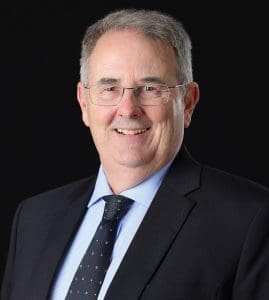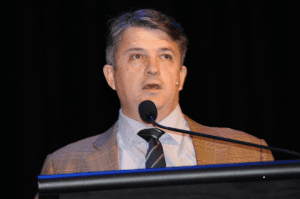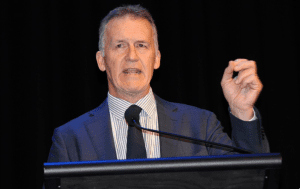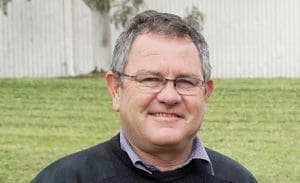
AWTA managing director Michael Jackson – heading hub discussions. Image – AWTA.
AUSTRALIAN wool industry organisations are working to develop a traceability hub potentially managed by the nation’s testing authority AWTA Ltd.
The first details of the proposed hub were released by the participating bodies at Wool Week in Melbourne last week and approved by them in a one-page statement yesterday after a meeting in Sydney on Monday.
The hub proposal follows on from a WoolProducers Australia traceability report that highlighted the importance of industry service organisations, Australian Wool Innovation, Australian Wool Exchange and Australian Wool Testing Authority (AWTA), aligning resources to provide a database that allowed a rapid response to an emergency animal disease outbreak with widespread adoption, and support provenance and other non-physical attributes of wool being passed through the supply chain.
Hub group spokesman and AWTA managing director Michael Jackson said the National Council Wool Selling Brokers Association and Australian Council Wool Exporters & Processors initiated informal discussions to explore how this could be progressed, involving AWI and AWEX in the first instance.
An early outcome was the consolidation of electronic classer specifications where AWEX is now providing a single solution to industry through WoolClip that interfaces with other industry software systems, he said.
“More recently, the group has involved AWTA and then WPA to look for other areas where cooperation could accelerate progress.
“This identified that there was potential to provide a platform to digitally carry information from farm to the first stage processors who remove wool from its pack,” Mr Jackson said.
Mr Jackson said the concept is to establish an Australian Wool Traceability Hub (AWTH).
Hub will be independent of AWI’s WoolQ
 He said the initial plan is that AWI will maintain its intellectual property in the WoolQ software code used in the hub, with AWTA licensed to use it to run the AWTH.
He said the initial plan is that AWI will maintain its intellectual property in the WoolQ software code used in the hub, with AWTA licensed to use it to run the AWTH.
“AWTA will manage the database and that will be confidential to AWTA ie AWI will not have access to the information about individual lots.
“It (the hub) will operate independently of WoolQ,” he said.
Mr Jackson said the proposed hub will:
- be managed by AWTA (whose Test Certificates already carry much of this data from sellers to buyers);
- Use some software code originally written by AWI for WoolQ along with further functionality to enhance traceability. For avoidance of confusion, it will only be a small subset of WoolQ functionality, with areas such as selling systems, data analytics and other areas removed;
- Respect the confidentiality and commercial interests in the current supply chain, just as AWTA currently does with its wool testing certification;
- Be interoperable with AWEX’s WoolClip;
- Utilise the new RFID enabled packs that AWEX is introducing to provide enhanced tracking of the movement of wool bales. This, along with capturing PIC data, is critical to being able to respond quickly to any outbreak of EAD to restore market access as soon as possible;
- Allow the input of on farm practices by the wool grower;
- Develop methods for accepting input of verified data from various sustainability schemes;
- Provide exporters with the ability to pass this information to their processor customers;
- Become an input for other traceability schemes that track wool after it is removed from the wool pack for scouring.
Consultation on proposed hub to continue
Mr Jackson said the group believes that the concept has potential to achieve these aims and has proceeded to a new stage of consultation to judge if there is sufficient industry support for it to succeed.
“That commenced with a series of presentations and discussions at Wool Week meetings.
“The group, with the addition of Australian Association of Stud Merino Breeders (AASMB), met again today to review feedback from Wool Week and were encouraged that there is ample good will to proceed,” he said.
“As such, AWTA, as the proposed manager of the traceability hub will now be meeting with individual companies in the wool industry to determine what assurances are required for them to participate in the hub.”
Mr Jackson said industry body representatives attending the Sydney meeting included himself, WPA CEO Jo Hall, AWI CEO John Roberts, AWEX CEO Mark Grave, ACWEP president Josh Lamb, NCWSBA president Rowan Woods and AASMB vice president Geoff Davidson.
Increasing demands for certified Australian wool

ACWEP president Josh Lamb at the recent KareeWool forum.
At the Wool Week forum last Friday, Mr Lamb said there were increasing demands for Australian wool to be certified with integrity.
He said the current traceability systems for downstream users “are falling apart a little bit” and more complaints are coming in about the main integrity system being used, the Responsible Wool Standard. Although he said RWS had helped put wool growers in other countries on a level playing field, he said.
Describing the roles of the digital WoolClip eSpeci, the eBale system and SustainaWOOL, Mark Grave said traceability depends on being able to aggregate and access data through the interoperability of systems.
“We’ve got building blocks that are in place, that’s really the message here.
“We’ve got building blocks that we have had over many years that are robust and carry higher levels of integrity than some of the schemes actually allow for,” he said.

AWEX CEO Mark Grave.
“We’re now trying to take advantage of that by having the traceability hub and we’re really only at the start of that journey in terms of what that will mean and how we will benefit from it.”
Mr Jackson said AWTA was talking with AWI about making use of the “good bits” of WoolQ relating to traceability to form the hub. He said AWTA was independent and respected, did not interfere with commercial relationships between buyers and sellers, and would apply the same discipline and trust that the industry has in AWTA, while maintaining the confidentiality of data.
“That’s fundamental to what we do, we wouldn’t change that.”
Mr Jackson said there would be nothing to stop other integrity systems, such as RWS and New Zealand’s ZQ, or growers’ data on their carbon footprint, feeding into the hub.
“It’s meant to be a vehicle that enables things to happen, rather than dictating how things will happen.”

NCWSBA president Rowan Woods.
NCWSBA president Rowan Woods said brokers were unanimous in that WoolQ had been a waste of growers’ funds, but wanted to do what they could about that, and RWS was “on the nose from the brokers’ point of view.”
“It’s a lot of work and we felt we wanted to have our own traceability program if it could be achieved and WoolQ had some of that infrastructure, some of that architecture to be able to do that.
“That message was conveyed pretty clearly to (AWI chief executive officer) John Roberts 12 months ago.”
After meeting with brokers on Monday, it was obvious there was a real willingness among NCWSBA members to make the hub happen, Mr Woods said.
He said brokers had been uneasy that the hub might be a “rebrand of WoolQ trotted out again.”
“But once AWTA became involved we feel that there is some safety, because they are the custodian of the data we pay for and hence own.”
Mr Jackson said the natural organisation to set the rules on how the hub would work was Wool Industries Australia. WIA members include AWEX, AWH, AWI, ACWEP, AWTA, NCWSBA, the Department of Jobs, Precincts & Regions, WPA and the University of New England.
AWI director Don Macdonald said the timing of the hub was right because AWI is looking at elevating the status of the Woolmark.
“Australia owns the Woolmark yet a lot of the rest of the world piggybacks off its integrity.
“So Woolmark+ with this data hub is actually a good opportunity for AWI to elevate the status of Woolmark and I don’t think there would be any grower that wouldn’t think that’s not a good idea.”
Mr Lamb said there had been discussions about attaching Woolmark+ to SustainaWOOL which would be “massive.”
WPA vice president Stacey Lugsdin said it was important for the hub to continue to involve and collaborate with growers and grower organisations on traceability.



HAVE YOUR SAY